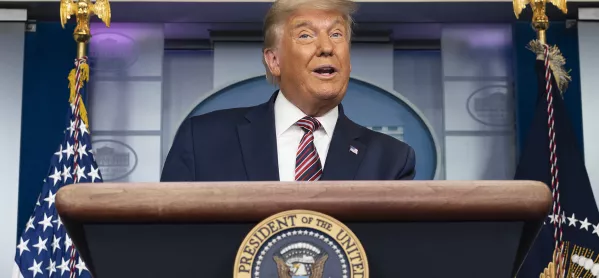American politics hasn’t usually been a hot topic in the classroom over the course of my time as a primary teacher. There was more awareness after Barack Obama became the first black president, but I am sure that children in this country have not talked about any other president more than Donald Trump.
For the past four years, even when just Trump’s still image was displayed on a screen, it would result in widespread hilarity and comments from children of all different ages. We just couldn’t seem to get away from him. Be it his public refusal to acknowledge the harms of climate change, his derogatory comments towards climate activist Greta Thunberg or his policies around gun control and failure to criticise far-right groups, his name was mentioned regularly.
When I started this year with my P7 class (aged 11-12), I focused on the teaching of the UN’s 17 Sustainable Development Goals (SDGs). With less than 10 years to achieve these globally, it is now more important than ever to raise awareness of the huge work that still lies ahead. Having an understanding of the SDGs at the beginning of the year means that we continuously tie these into our learning across the curriculum, embedding the concepts and making sure that learners understand the relevance of classroom activities to real life.
Trump’s like a teenager? What an insult to our young people
Opinion: Why we can’t assume every student welcomes a Biden win
US election: ‘Teaching politics is exciting - and exhausting’
Quick read: I’m a teacher who stutters - Joe Biden is inspirational
Black Lives Matter: Why I won’t be put off tackling racism through education
Inevitably, we spent some time looking at how different countries around the world are tackling the climate emergency. Enter the United States. As the world’s second-largest emitter of harmful gases, pupils naturally wanted to know why this is and what is being done about it.
It’s very important to note that children have an inherent understanding of fairness and social justice. We, as teachers, have done an admirable job in recent years to teach them about their rights and the importance of the UN Convention on the Rights of the Child. As a result, they can see how the 17 SDGs link together in an aim to create a fairer world that also takes care of the environment we live in.
Of course, as a teacher, I do not share my political opinions. However, I do encourage my pupils to understand and fight for fairness in every aspect of their lives. My class is encouraged to think critically about actions around the world and their consequences. They were baffled by President Trump’s withdrawal from the Paris Climate Agreement and by why the US is still not signed up to the UNCRC, which in Scotland is now enshrined in law. They questioned the language he has used around welcoming immigrants to the US and his attitude towards the Black Lives Matter movement.
Cue the Monday morning after the election. I wondered what my class’s reaction would be to President Trump’s defeat and what impact this would have around the world. Reactions ranged from relief, thankfulness and excitement, to nervousness, fear and shock.
Digging deeper, we discussed what they thought would be the legacy of the man. Overwhelmingly, my class felt that he would be remembered for causing divisions and racism. This generation, which witnessed the Black Lives Matter movement and inequality as Covid-19 surged around the world, found the policies of the Trump administration really difficult to comprehend.
I’m glad to report within my class there were positive hopes for the future after it became clear that there would be a change in the presidency. Linking back to our learning about the SDGs, pupils felt there may be changes in gun laws, a renewed focus on climate action, better handling of the coronavirus and less racism. To quote one of my pupils, “This is a watershed moment.”
The values of global citizenship are winning - let’s keep it that way.
Nuzhat Uthmani is a teacher, a trustee at the WOSDEC Global Learning Centre in Glasgow, and founder of Global Citizenship Education Scotland. She tweets @NUthmani





